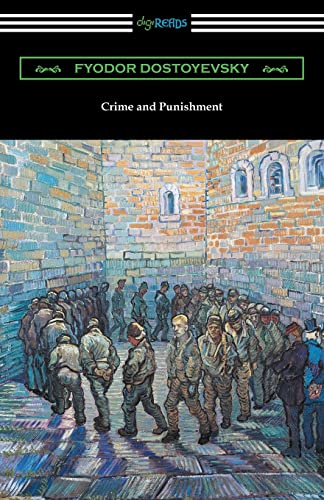Crime and Punishment (Translated by Constance Garnett with an Introduction by Nathan B. Fagin)
Fyodor Dostoyevsky
BOOK REVIEW

In the shadowy depths of St. Petersburg, a tormented soul is caught in a web of morality, guilt, and existential dread. Crime and Punishment, penned by the brilliant Fyodor Dostoyevsky, thrusts you into the chaotic mind of Raskolnikov, a disillusioned former student who convinces himself that extraordinary individuals can transcend moral boundaries. But the question is - at what cost?
Raskolnikov's internal struggle serves as a crucible for profound psychological exploration. He commits an unthinkable crime, believing it will elevate him to a higher plateau of existence, free him from the common constraints of morality. Yet, what unfolds is far from liberation; it spirals into a haunting descent into madness. Dostoyevsky, with his uncanny ability to dive into the darkest corners of the human psyche, crafts a narrative that is both riveting and unsettling.
This novel is not merely about crime; it's a full-bodied examination of suffering that transcends time and cultural boundaries. Dostoyevsky masterfully interweaves themes of redemption, poverty, and the philosophical clash between nihilism and faith. You cannot help but reflect on your own values as you vicariously experience Raskolnikov's torment, questioning whether the pursuit of a greater good ever justifies moral decay. Can you feel the weight of that verdict? 💔
Readers have long been captivated (and polarized) by Raskolnikov's internal battle, and opinions about his character are as intense as the narrative itself. Some argue that Dostoyevsky's portrayal is an indictment of radical ideologies, suggesting a slippery slope where moral relativism leads relentlessly to chaos. On the contrary, others find sympathy for Raskolnikov, interpreting his actions through the lens of desperation and a longing for purpose. Each perspective brings us face-to-face with our darkest fears and assumptions about right and wrong.
Digging deeper, the historical context of the novel adds a substantial layer to its richness. Written amid the philosophical upheaval of 19th-century Russia, a time when traditional values were colliding with emerging ideas of socialism and rationalism, "Crime and Punishment" reflects the intense social struggles of the era. Dostoyevsky, having himself experienced poverty and the psychological toll of a fragmented society, channels these experiences into his characters, revealing a harrowing truth about the human condition.
Reflecting upon the impact of the story, it's impossible to ignore how Crime and Punishment has reverberated throughout culture. Influencing thinkers from Friedrich Nietzsche to modern-day psychologists, Dostoyevsky challenges each of us to confront our moral compass. The dialogue that emerges about guilt, redemption, and the nature of evil remains supremely relevant, even in today's society fraught with division and moral ambiguity.
The reader's journey through Crime and Punishment is one of agonizing introspection. Have you ever felt torn between your ambitions and the morals you were raised with? Raskolnikov's anguish seeps into your consciousness, leading to moments of profound self-reflection and, at times, sheer terror. You may find yourself losing sleep over the chilling implications of ethical dilemmas and the results of cold, rational thought unchecked by humanity.
As the narrative unfolds towards its thunderous conclusion, prepare to grapple with heartbreaking revelations that will shake your perception of justice and mercy. Dostoyevsky's storytelling immerses you in a psychological labyrinth where the only exit is through a deep understanding of the human experience. Though your heart may feel battered, the catharsis that follows is indescribably powerful, leaving you nostalgic for the moments of clarity amid chaos.
In the end, Dostoyevsky doesn't just write a story; he offers a mirror reflecting the complexities of our souls. Are you ready to peer into that darkness? 📖 Dive into Crime and Punishment and discover what lies within your own moral landscape.
📖 Crime and Punishment (Translated by Constance Garnett with an Introduction by Nathan B. Fagin)
✍ by Fyodor Dostoyevsky
🧾 428 pages
2017
#crime #punishment #translated #constance #garnett #with #introduction #nathan #fagin #fyodor #dostoyevsky #FyodorDostoyevsky